The Biodegradable Lidding Films Market is estimated to be valued at USD 1.3 billion in 2025 and is projected to reach USD 3.2 billion by 2035, registering a compound annual growth rate (CAGR) of 9.2% over the forecast period.
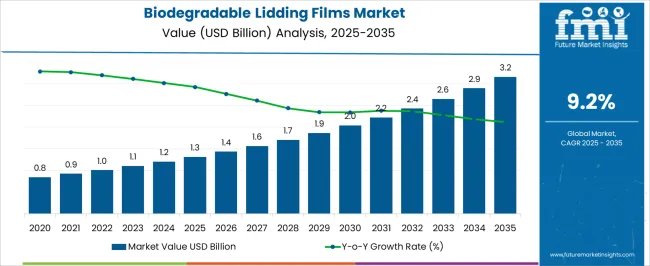
| Metric | Value |
|---|---|
| Biodegradable Lidding Films Market Estimated Value in (2025 E) | USD 1.3 billion |
| Biodegradable Lidding Films Market Forecast Value in (2035 F) | USD 3.2 billion |
| Forecast CAGR (2025 to 2035) | 9.2% |
The biodegradable lidding films market is gaining strong traction globally, driven by increasing regulatory mandates on single-use plastics and a rising consumer preference for environmentally responsible packaging. The transition toward compostable and biodegradable materials has been reinforced by major retailers and food processors investing in sustainable packaging innovation.
Biodegradable lidding films are being adopted due to their ability to maintain freshness, extend shelf life, and provide effective sealing solutions for perishable products, while aligning with end-of-life circular economy goals. Innovations in bio-based polymers, such as polylactic acid and cellulose blends, have enabled better compatibility with existing thermoforming and heat-sealing systems, ensuring functional equivalence to traditional films.
Moreover, manufacturers are focusing on material clarity, puncture resistance, and oxygen transmission rates to optimize film performance The future of the market is expected to be shaped by continued R&D into multilayer biodegradable structures and the scaling of industrial composting infrastructure, positioning these films as a central solution in the shift toward low-impact packaging.
The market is segmented by Application, Seal Type, and Material and region. By Application, the market is divided into Fresh meat, Fish, Poultry, Sausages and cured meat, Cooked meat, Cheese, Sauces and soups, Ready meals, Processed products, and Non-food products. In terms of Seal Type, the market is classified into TruPeel – peelable seal, TruSeal – permanent (weld) seal, and RePeel – multi-use seal. Based on Material, the market is segmented into CAPFILM PET, CAPFILM PP, and CAPFILM PE. Regionally, the market is classified into North America, Latin America, Western Europe, Eastern Europe, Balkan & Baltic Countries, Russia & Belarus, Central Asia, East Asia, South Asia & Pacific, and the Middle East & Africa.
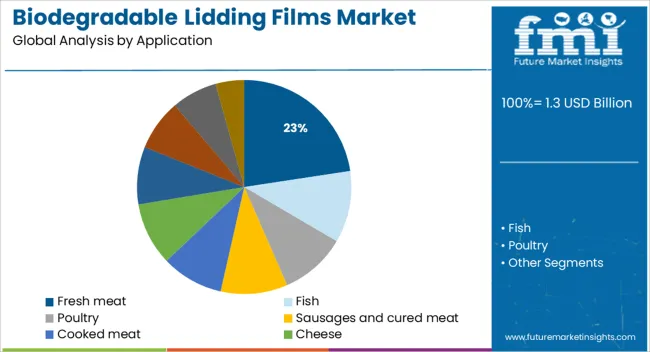
The fresh meat segment is projected to account for 22.6% of the total revenue share in the biodegradable lidding films market in 2025, emerging as a leading application area. Growth in this segment is being driven by increasing consumer awareness regarding sustainable meat packaging, along with stringent regulations limiting the use of non-biodegradable plastics in fresh food applications. Biodegradable lidding films used for fresh meat packaging are being preferred for their ability to maintain oxygen balance, reduce spoilage, and provide a strong yet environmentally safe seal.
Advancements in high-barrier biodegradable films have enabled the preservation of meat quality while supporting extended shelf life under chilled conditions. The shift in consumer demand toward ethical packaging for animal-based products has further reinforced this trend.
Enhanced compatibility of biodegradable films with modified atmosphere packaging systems used in meat processing plants has made adoption more seamless As sustainability continues to influence retail packaging decisions, fresh meat is expected to remain a key growth segment.
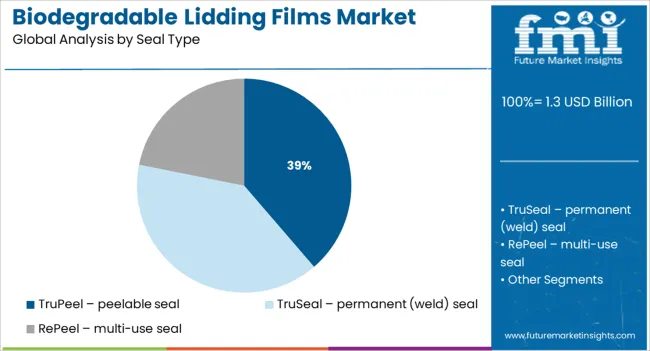
The TruPeel peelable seal segment is anticipated to capture 38.7% of the total revenue share in the biodegradable lidding films market in 2025, making it a dominant sealing solution. This segment's growth has been driven by the demand for easy-to-open, consumer-friendly packaging that also aligns with compostable and recyclable standards. TruPeel technology has been integrated into biodegradable films to provide a clean, consistent peel with controlled adhesion, reducing user frustration while preserving product integrity.
Manufacturers have favored TruPeel systems due to their compatibility with various tray materials, including biodegradable and recyclable trays, offering greater flexibility across different product formats. These peelable seals have shown excellent performance in cold chain environments and are being used extensively in prepared meals, produce, and dairy segments.
Their ability to provide tamper-evident seals without leaving residue has further strengthened consumer trust in sustainable packaging As packaging accessibility and environmental compliance converge, peelable seals like TruPeel are expected to retain a leading market position.
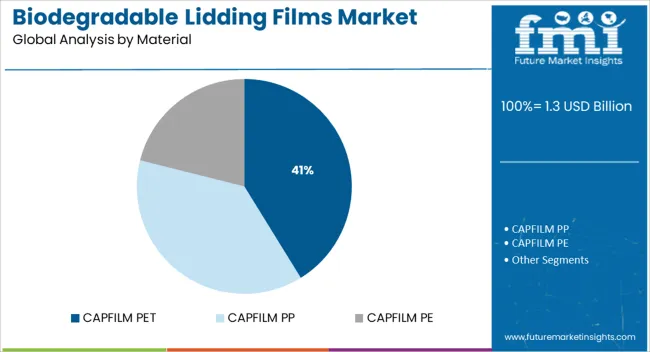
The CAPFILM PET material segment is expected to hold 41.2% of the total revenue share in the biodegradable lidding films market in 2025, representing the largest share among materials. This dominance is attributed to the material’s excellent mechanical strength, thermal resistance, and superior sealing properties, which are essential in high-speed packaging lines. CAPFILM PET has gained widespread adoption in biodegradable film formulations due to its compatibility with bio-based coatings and multilayer constructions that meet compostability criteria.
Its clarity and gloss provide strong shelf appeal, especially in food categories where product visibility is crucial. The material’s resistance to delamination and moisture ingress supports extended shelf life and maintains barrier performance in refrigerated and frozen applications.
Additionally, CAPFILM PET’s recyclability and low environmental impact profile align with corporate sustainability initiatives and regulatory standards As food brands continue to replace legacy petroleum-based lidding materials, CAPFILM PET is anticipated to remain the preferred substrate for high-performance biodegradable applications.
The Global Biodegradable Lidding Films market is correlated to the significant presence of organized retail and wholesale sector across the world. Biodegradable materials are plastic films whose raw material is vegetative such as corn starch, tapioca products or sugarcanes.
These thermoplastic aliphatic materials are derived from renewable resources called Polylactic acid or polylactide, shortly named PLA, and can biodegrade under the presence of oxygen. Biodegradable Lidding Films are used for the packaging of prepared food, tablets, and in syrup bottles.
Biodegradable Lidding Films currently are experiencing significant adoption amongst various industries, across the globe. Nowadays, consumers are more interested in buying processed food products including frozen foods, prepared meals, meat products, and others directly from the supermarket.
Also, in recent years, the middle-level income population with comparatively higher disposable capital income has increased, and most of the population these days prefers using biodegradable products. Since most of the working population prefers to consume healthy processed food, the market for Biodegradable Lidding Films is expected to foresee significant growth.
In the food industry, Biodegradable Lidding Films provide customers with a ‘no-touch’ cooking solution, allowing them to take food products directly from the freezer to their use.
This aspect of cooking helps in avoiding product contamination. Thus, Biodegradable Lidding Films facilitate improved food safety, and this particular factor will add to the growth of the biodegradable lidding films market share during the assessment period.
Trends such as the growing popularity of packaging in trays and speciality containers, modified atmosphere packaging (MAP), retort packaging applications and others are expected to drive the Biodegradable Lidding Films market substantially in the forecast period.
Across the globe, major manufacturers in the film packaging industry are focusing on manufacturing Biodegradable Lidding Films these days. Similarly, maximum users in the frozen foods and meat products packaging industry across the globe are focusing on reducing their carbon footprint.
There is a great demand for Biodegradable Lidding Films owing to customer inclination towards the use of clean materials and an increase in health awareness. Also, in many countries, the government is encouraging the use of biodegradable products across various industries. These are a few of the major reasons driving the Biodegradable Lidding Films market.
There are some restraints in the Biodegradable Lidding Films market, which are hindering the prospective growth.
Fluctuating raw material prices have become a serious issue for manufacturers of Biodegradable Lidding Films. Varying prices of film materials, printing inks, and seal types are hampering the profitability of value chain participants in the global lidding film manufacturing industry.
Additionally, the manufacturing cost is also affected by currency fluctuations. Changes in global supply and demand, fluctuations in the market, exchange rates, government controls and other factors may affect the raw material prices of Biodegradable Lidding Films, particularly in the European countries where the production cost is high because of the high cost of polymers.
Global Biodegradable Lidding FilmsMarket is mainly classified on the basis of application, seal type, the material used, and geographies.
On the basis of the application of Biodegradable Lidding Films, the global Biodegradable Lidding Films market is segmented into fresh meat, fish, poultry, sausages and cured meat, cooked meat, cheese, sauces and soups, ready meals, processed products, and non-food products.
On the basis of seal type, the Biodegradable Lidding Films market can be segmented as TruSeal - permanent (weld) seal, RePeel - multi-use seal, and TruPeel - peelable seal.
On the basis of materials used, the Biodegradable Lidding Films market can be segmented as CAPFILM PP, CAPFILM PE, and CAPFILM PET.
On the basis of geographies, the market is segmented across 7 key regions:
Biodegradable Lidding Films have significant applications in the frozen food industry, for providing safe and hygienic coverage to the packages.
Since Europe is the major region, followed by North America in terms of the market for frozen food; the Biodegradable Lidding Film market in the European and North American regions is expected to grow considerably. With a continuously growing population, this market is expected to grow in other regions including Asia Pacific, and Japan as well.
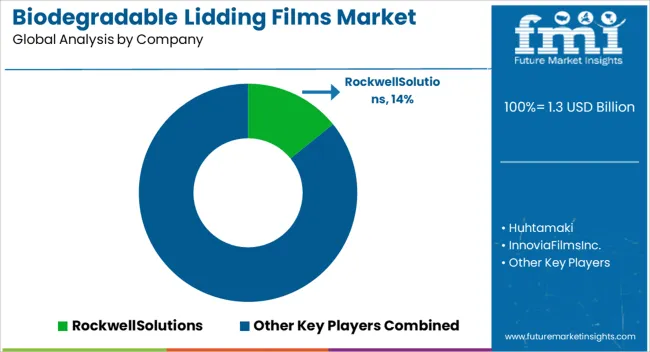
Some of the major players active in the global Biodegradable Lidding Films market include Rockwell Solutions, Quantum Packaging, SealMAX, Source One Packaging, Xpert Packaging Inc., Clondalkin Flexible Packaging, Innovia Films Inc., American Profol Inc., International Paper and Plastic, Huhtamaki, National Flexible, NJB PACKAGING, and others.
Since the adoption of biodegradable products has increased significantly across most of the markets and industries, overall it can be concluded that the growth prospect of the lidding films industry in reference to biodegradable products, is promising.
The research report presents a comprehensive assessment of the market and contains thoughtful insights, facts, historical data, and statistically supported and industry-validated market data.
It also contains projections using a suitable set of assumptions and methodologies. The research report provides analysis and information according to categories such as market segments, geographies, types, technology and applications.
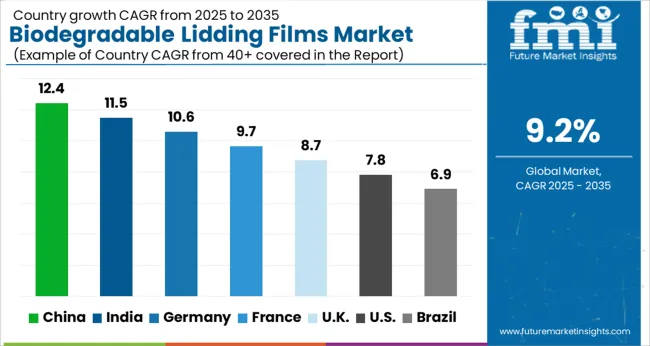
The report is a compilation of first-hand information, qualitative and quantitative assessment by industry analysts, inputs from industry experts and industry participants across the value chain.
The report provides in-depth analysis of parent market trends, macro-economic indicators and governing factors along with market attractiveness as per segments. The report also maps the qualitative impact of various market factors on market segments and geographies.
The global biodegradable lidding films market is estimated to be valued at USD 1.3 billion in 2025.
The market size for the biodegradable lidding films market is projected to reach USD 3.2 billion by 2035.
The biodegradable lidding films market is expected to grow at a 9.2% CAGR between 2025 and 2035.
The key product types in biodegradable lidding films market are fresh meat, fish, poultry, sausages and cured meat, cooked meat, cheese, sauces and soups, ready meals, processed products and non-food products.
In terms of seal type, trupeel – peelable seal segment to command 38.7% share in the biodegradable lidding films market in 2025.






Our Research Products

The "Full Research Suite" delivers actionable market intel, deep dives on markets or technologies, so clients act faster, cut risk, and unlock growth.

The Leaderboard benchmarks and ranks top vendors, classifying them as Established Leaders, Leading Challengers, or Disruptors & Challengers.

Locates where complements amplify value and substitutes erode it, forecasting net impact by horizon

We deliver granular, decision-grade intel: market sizing, 5-year forecasts, pricing, adoption, usage, revenue, and operational KPIs—plus competitor tracking, regulation, and value chains—across 60 countries broadly.

Spot the shifts before they hit your P&L. We track inflection points, adoption curves, pricing moves, and ecosystem plays to show where demand is heading, why it is changing, and what to do next across high-growth markets and disruptive tech

Real-time reads of user behavior. We track shifting priorities, perceptions of today’s and next-gen services, and provider experience, then pace how fast tech moves from trial to adoption, blending buyer, consumer, and channel inputs with social signals (#WhySwitch, #UX).

Partner with our analyst team to build a custom report designed around your business priorities. From analysing market trends to assessing competitors or crafting bespoke datasets, we tailor insights to your needs.
Supplier Intelligence
Discovery & Profiling
Capacity & Footprint
Performance & Risk
Compliance & Governance
Commercial Readiness
Who Supplies Whom
Scorecards & Shortlists
Playbooks & Docs
Category Intelligence
Definition & Scope
Demand & Use Cases
Cost Drivers
Market Structure
Supply Chain Map
Trade & Policy
Operating Norms
Deliverables
Buyer Intelligence
Account Basics
Spend & Scope
Procurement Model
Vendor Requirements
Terms & Policies
Entry Strategy
Pain Points & Triggers
Outputs
Pricing Analysis
Benchmarks
Trends
Should-Cost
Indexation
Landed Cost
Commercial Terms
Deliverables
Brand Analysis
Positioning & Value Prop
Share & Presence
Customer Evidence
Go-to-Market
Digital & Reputation
Compliance & Trust
KPIs & Gaps
Outputs
Full Research Suite comprises of:
Market outlook & trends analysis
Interviews & case studies
Strategic recommendations
Vendor profiles & capabilities analysis
5-year forecasts
8 regions and 60+ country-level data splits
Market segment data splits
12 months of continuous data updates
DELIVERED AS:
PDF EXCEL ONLINE
Competitive Breakdown of Biodegradable Lidding Films Providers
Biodegradable Film Market Size and Share Forecast Outlook 2025 to 2035
Biodegradable Disposable Tableware Market Size and Share Forecast Outlook 2025 to 2035
Biodegradable Paper and Plastic Packaging Market Size and Share Forecast Outlook 2025 to 2035
Biodegradable Polyester Fiber Market Forecast and Outlook 2025 to 2035
Biodegradable Packaging Market Size and Share Forecast Outlook 2025 to 2035
Biodegradable Insulated Panel Market Size and Share Forecast Outlook 2025 to 2035
Biodegradable Polyamide Market Size and Share Forecast Outlook 2025 to 2035
Biodegradable Glitter for Cosmetics Market Analysis - Size, Share, and Forecast Outlook 2025 to 2035
Biodegradable Meal Trays Market Size and Share Forecast Outlook 2025 to 2035
Biodegradable Gloves Market Size and Share Forecast Outlook 2025 to 2035
Biodegradable Bone Graft Polymers Market Size and Share Forecast Outlook 2025 to 2035
Biodegradable Food Packaging Market Size, Share & Forecast 2025 to 2035
Biodegradable Polymers Market Growth 2025 to 2035
Biodegradable Baby Diapers Market Analysis – Trends, Growth & Forecast 2025-2035
Biodegradable Microbeads Market Growth – Trends & Forecast 2025 to 2035
Competitive Landscape of Biodegradable Packaging Providers
Biodegradable Lids Market Analysis - Demand, Trends & Outlook 2024 to 2034
Biodegradable Cutlery Market
Biodegradable water bottles Market

Thank you!
You will receive an email from our Business Development Manager. Please be sure to check your SPAM/JUNK folder too.
Chat With
MaRIA